专四语法总结
专四语法
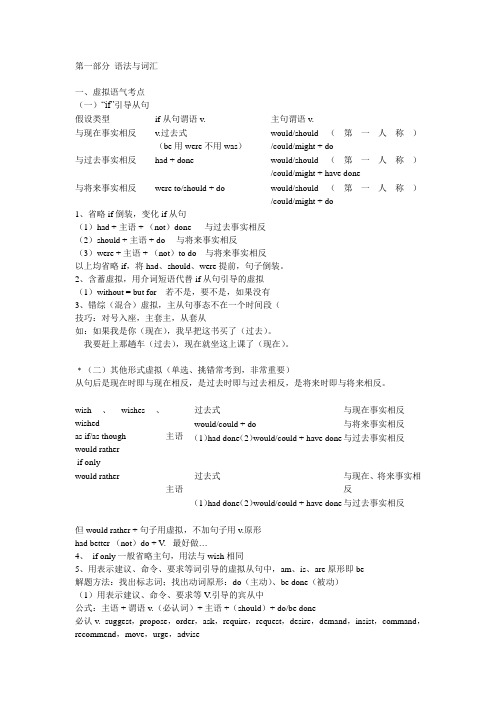
第一部分语法与词汇一、虚拟语气考点(一)“if”引导从句假设类型if从句谓语v. 主句谓语v.与现在事实相反v.过去式(be用were不用was)would/should(第一人称)/could/might + do与过去事实相反had + done would/should(第一人称)/could/might + have done与将来事实相反were to/should + do would/should(第一人称)/could/might + do1、省略if倒装,变化if从句(1)had + 主语 + (not)done 与过去事实相反(2)should + 主语 + do 与将来事实相反(3)were + 主语 + (not)to do 与将来事实相反以上均省略if,将had、should、were提前,句子倒装。
2、含蓄虚拟,用介词短语代替if从句引导的虚拟(1)without = but for 若不是,要不是,如果没有3、错综(混合)虚拟,主从句事态不在一个时间段(技巧:对号入座,主套主,从套从如:如果我是你(现在),我早把这书买了(过去)。
我要赶上那趟车(过去),现在就坐这上课了(现在)。
﹡(二)其他形式虚拟(单选、挑错常考到,非常重要)从句后是现在时即与现在相反,是过去时即与过去相反,是将来时即与将来相反。
wish、wishes、wishedas if/as though would rather if only 主语过去式与现在事实相反would/could + do 与将来事实相反(1)had done(2)would/could + have done 与过去事实相反would rather主语过去式与现在、将来事实相反(1)had done(2)would/could + have done 与过去事实相反但would rather + 句子用虚拟,不加句子用v.原形had better (not)do + V. 最好做…4、 if only 一般省略主句,用法与wish相同5、用表示建议、命令、要求等词引导的虚拟从句中,am、is、are原形即be解题方法:找出标志词;找出动词原形:do(主动)、be done(被动)(1)用表示建议、命令、要求等V.引导的宾从中公式:主语 + 谓语v.(必认词)+ 主语 +(should)+ do/be done必认v. suggest,propose,order,ask,require,request,desire,demand,insist,command,recommend,move,urge,advise(2)用于与建议、命令、要求等V.意义类似的形容词所引导的从句公式:It is + adj. (必认词)+ that + 主语 +(should)+ do/be done必认adj. suggested,proposed,ordered,asked,required,requested,desired(desirable),demanded,commanded,recommended,urgent,advisable,important,vital,essential,necessary, imperative(3)与表示建议、命令、要求等v.相类似的n.引导的表语从句和同位语从句表从公式:主语 + 系词 + that + 主语(should) + do/be done同位从公式:n. + that + 主语(should)+ do/be done必认n. suggestion,proposal,order,requirement,request,desire,demand,insistence,requirement,request,desire,demand,insistence,motion,recommendation,advice6、 It's/was/ + time + that + 主语 + did(过去式)早该到…的时间了/high time/about time7、跳层虚拟公式:真实,otherwise / or + 虚拟虚拟,but + 真实(一般考过去时)特点:真实——过去时或 must have done,对过去肯定猜测虚拟——would / could + have done(三)情态v. + have done ,表示对过去事情的推测must + have done 肯定,没有musn't(表禁止…)could + have done 本能够,可能做(但未做)may + have done 本可能,或许might + have done 本可能should = ought to + have done 本应做,而未做(含责备)shouldn't = oughtn't to + have done 本不应做而做了(含责备)needn't + have done 没有必要做而做了(无责备)need 情态v.“必要” + v.实义v.“需要” + need doing(形式主动,实际被动) = need to be done“需要”need + to do二、非谓语动词(一)不定式: to do / not to do1、形式(时态/语态), vt.(vi.只有主动)基本形式:主动被动﹡一般式to do to be done﹡完成式to have done to have been done进行式to be doing ×完成进行式to have been doing ×注意:不定式的一般式表示动作与主句的动作将要发生或同时发生,而不定式的完成式表示动作要先于主句的动作前发生,不定式的完成式不能作定语。
专四语法 可可英语

专四语法可可英语好的,以下是一篇有关可可英语专四语法的文章:可可英语专四语法精讲一、虚拟语气虚拟语气是英语语法中一个非常重要的部分,在专四考试中也是必考的知识点。
虚拟语气用来表示与实际情况相反的情况或者表达主观上的愿望、建议、猜测等。
虚拟语气的用法包括与现在事实相反、与过去事实相反和与将来事实相反三种情况。
1. 与现在事实相反:使用动词的过去式(be动词用were),从句使用would+动词原形。
例如:If I were you,I would choose to study abroad.(如果我是你,我会选择出国留学。
)2. 与过去事实相反:使用“would+have+过去分词”,从句使用“had+过去分词”。
例如:If we had known the answer,we would have told you.(如果我们知道答案,我们早就告诉你了。
)3. 与将来事实相反:使用“would+动词原形”,从句使用“were+to+动词原形”或者“should+动词原形”。
例如:If it were to rain tomorrow,the football match would be postponed.(如果明天下雨,足球比赛就会被推迟。
)二、定语从句定语从句是英语语法中的另一个重要知识点,也是专四考试的重点。
定语从句用来修饰名词,通常放在所修饰名词之后。
引导定语从句的关联词包括that、which、who、whose等。
1. 使用that的情况:当先行词为all、something、nothing、this等不定代词时,或者先行词被形容词最高级修饰时,多用that引导定语从句。
例如:This is the most interesting book that I have ever read.(这是我读过的最有趣的书。
)2. 使用which的情况:当引导词前面有逗号或放在句末时,通常使用which。
专四英语易错知识点总结
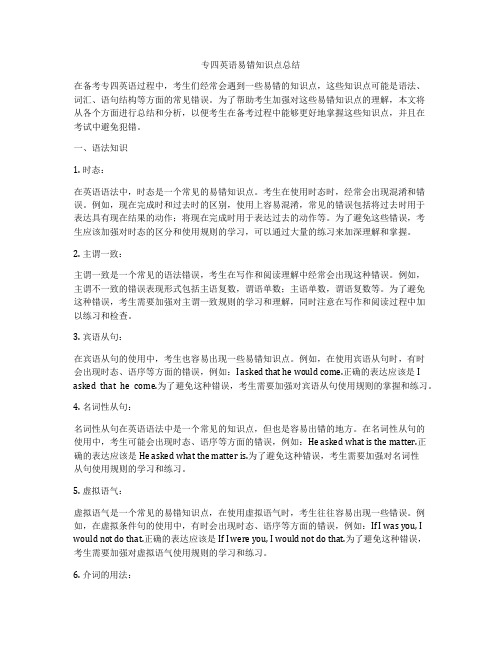
专四英语易错知识点总结在备考专四英语过程中,考生们经常会遇到一些易错的知识点,这些知识点可能是语法、词汇、语句结构等方面的常见错误。
为了帮助考生加强对这些易错知识点的理解,本文将从各个方面进行总结和分析,以便考生在备考过程中能够更好地掌握这些知识点,并且在考试中避免犯错。
一、语法知识1. 时态:在英语语法中,时态是一个常见的易错知识点。
考生在使用时态时,经常会出现混淆和错误。
例如,现在完成时和过去时的区别,使用上容易混淆,常见的错误包括将过去时用于表达具有现在结果的动作;将现在完成时用于表达过去的动作等。
为了避免这些错误,考生应该加强对时态的区分和使用规则的学习,可以通过大量的练习来加深理解和掌握。
2. 主谓一致:主谓一致是一个常见的语法错误,考生在写作和阅读理解中经常会出现这种错误。
例如,主谓不一致的错误表现形式包括主语复数,谓语单数;主语单数,谓语复数等。
为了避免这种错误,考生需要加强对主谓一致规则的学习和理解,同时注意在写作和阅读过程中加以练习和检查。
3. 宾语从句:在宾语从句的使用中,考生也容易出现一些易错知识点。
例如,在使用宾语从句时,有时会出现时态、语序等方面的错误,例如:I asked that he would come.正确的表达应该是I asked that he come.为了避免这种错误,考生需要加强对宾语从句使用规则的掌握和练习。
4. 名词性从句:名词性从句在英语语法中是一个常见的知识点,但也是容易出错的地方。
在名词性从句的使用中,考生可能会出现时态、语序等方面的错误,例如:He asked what is the matter.正确的表达应该是He asked what the matter is.为了避免这种错误,考生需要加强对名词性从句使用规则的学习和练习。
5. 虚拟语气:虚拟语气是一个常见的易错知识点,在使用虚拟语气时,考生往往容易出现一些错误。
例如,在虚拟条件句的使用中,有时会出现时态、语序等方面的错误,例如:If I was you, I would not do that.正确的表达应该是If I were you, I would not do that.为了避免这种错误,考生需要加强对虚拟语气使用规则的学习和练习。
英语专四语法复习内容

英语专四语法复习内容想要通过英语专四考试,就必须掌握英语专四的语法。
那么英语专四的语法有哪些呢?下面由店铺为大家整理的英语专四语法内容,希望大家喜欢!英语专四语法内容一 There be 结构1. There be结构There were very few people left when we got there.There have been many such incidents.Nearby there had been a fight in full progress.也可以是情态动词 +beThere can be very little doubt about his guilt.There may always be instances about which we are uncertain. There ought to / should be some instructions on the lid.还可以是There +情态动词+ be 的完成时There may have been an accident.If the criminal had come this way, there would be / would have been footprints. There should / ought to have been someone on duty all the time.2. There + 半动词+ be,这里很少用完成体形式.There is certain to be trouble at the factory.There is sure / likely to be some rain tonight. There seems / appears to be no doubt about it.3. There be结构也可有被动式,这类there be结构有些可以与there be结构的一般形式相互转换。
专四语法(做完题总结)
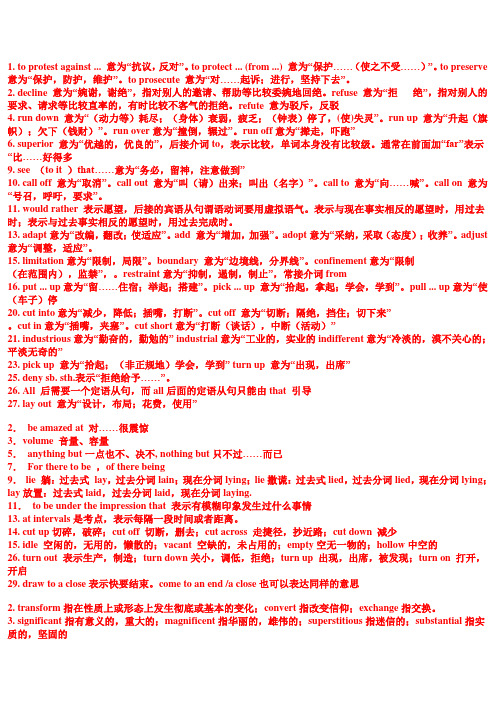
1. to protest against ... 意为“抗议,反对”。
to protect ... (from ...) 意为“保护……(使之不受……)”。
to preserve 意为“保护,防护,维护”。
to prosecute 意为“对……起诉;进行,坚持下去”。
2. decline 意为“婉谢,谢绝”,指对别人的邀请、帮助等比较委婉地回绝。
refuse 意为“拒绝”,指对别人的要求、请求等比较直率的,有时比较不客气的拒绝。
refute 意为驳斥,反驳4. run down 意为“(动力等)耗尽;(身体)衰弱,疲乏;(钟表)停了,(使)失灵”。
run up 意为“升起(旗帜);欠下(钱财)”。
run over意为“撞倒,辗过”。
run off意为“撵走,吓跑”6. superior 意为“优越的,优良的”,后接介词to,表示比较,单词本身没有比较级。
通常在前面加“far”表示“比……好得多9. see (to it )that……意为“务必,留神,注意做到”10. call off 意为“取消”。
call out 意为“叫(请)出来;叫出(名字)”。
call to 意为“向……喊”。
call on 意为“号召,呼吁,要求”。
11. would rather 表示愿望,后接的宾语从句谓语动词要用虚拟语气。
表示与现在事实相反的愿望时,用过去时;表示与过去事实相反的愿望时,用过去完成时。
13. adapt意为“改编,翻改;使适应”。
add 意为“增加,加强”。
adopt意为“采纳,采取(态度);收养”。
adjust 意为“调整,适应”。
15. limitation意为“限制,局限”。
boundary 意为“边境线,分界线”。
confinement意为“限制(在范围内),监禁”,。
restraint意为“抑制,遏制,制止”,常接介词from16. put ... up意为“留……住宿;举起;搭建”。
英语专四语法考点总结
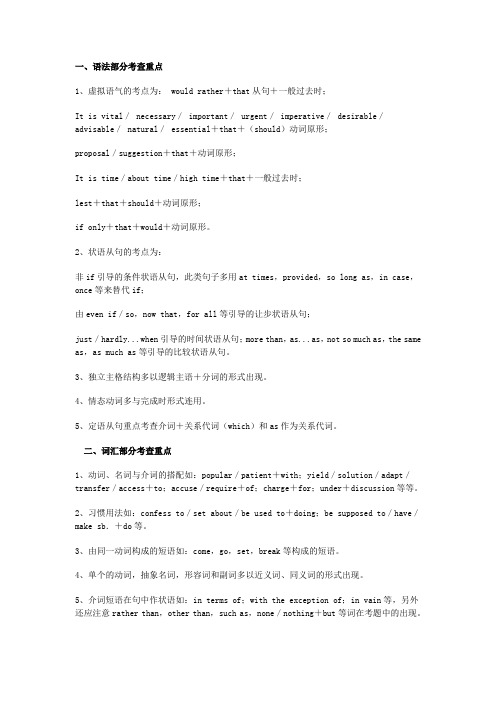
一、语法部分考查重点1、虚拟语气的考点为: would rather+that从句+一般过去时;It is vital/ necessary/ important/ urgent/ imperative/ desirable/advisable/ natural/ essential+that+(should)动词原形;proposal/suggestion+that+动词原形;It is time/about time/high time+that+一般过去时;lest+that+should+动词原形;if only+that+would+动词原形。
2、状语从句的考点为:非if引导的条件状语从句,此类句子多用at times,provided,so long as,in case,once等来替代if;由even if/so,now that,for all等引导的让步状语从句;just/hardly...when引导的时间状语从句;more than,as...as,not so much as,the same as,as much as等引导的比较状语从句。
3、独立主格结构多以逻辑主语+分词的形式出现。
4、情态动词多与完成时形式连用。
5、定语从句重点考查介词+关系代词(which)和as作为关系代词。
二、词汇部分考查重点1、动词、名词与介词的搭配如:popular/patient+with;yield/solution/adapt/transfer/access+to;accuse/require+of;charge+for;under+discussion等等。
2、习惯用法如:confess to/set about/be used to+doing;be supposed to/have/make sb.+do等。
3、由同一动词构成的短语如:come,go,set,break等构成的短语。
专四常考语法点
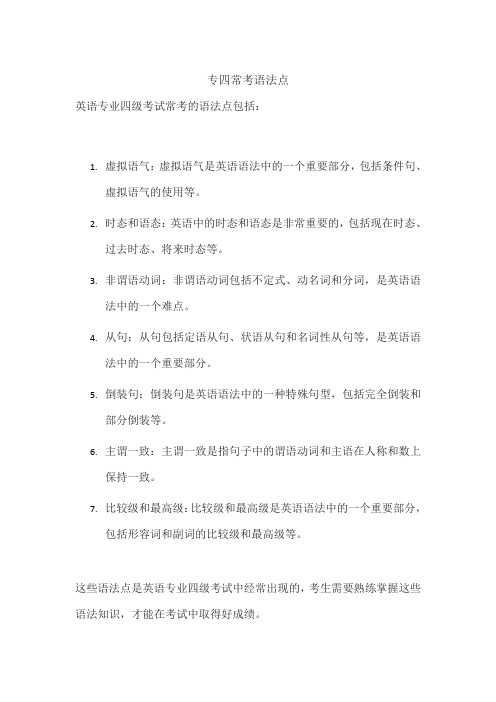
专四常考语法点
英语专业四级考试常考的语法点包括:
1.虚拟语气:虚拟语气是英语语法中的一个重要部分,包括条件句、
虚拟语气的使用等。
2.时态和语态:英语中的时态和语态是非常重要的,包括现在时态、
过去时态、将来时态等。
3.非谓语动词:非谓语动词包括不定式、动名词和分词,是英语语
法中的一个难点。
4.从句:从句包括定语从句、状语从句和名词性从句等,是英语语
法中的一个重要部分。
5.倒装句:倒装句是英语语法中的一种特殊句型,包括完全倒装和
部分倒装等。
6.主谓一致:主谓一致是指句子中的谓语动词和主语在人称和数上
保持一致。
7.比较级和最高级:比较级和最高级是英语语法中的一个重要部分,
包括形容词和副词的比较级和最高级等。
这些语法点是英语专业四级考试中经常出现的,考生需要熟练掌握这些语法知识,才能在考试中取得好成绩。
英语专四语法总结
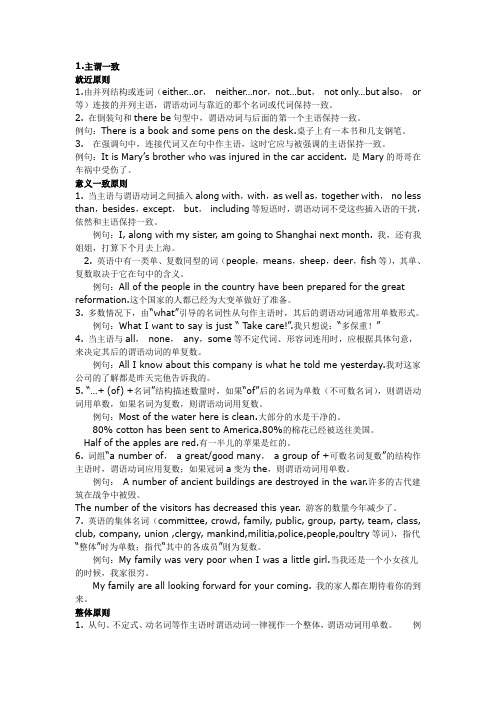
1.主谓一致就近原则1.由并列结构或连词(either…or,neither…nor,not…but,not only…but also,or 等)连接的并列主语,谓语动词与靠近的那个名词或代词保持一致。
2. 在倒装句和there be句型中,谓语动词与后面的第一个主语保持一致。
例句:There is a book and some pens on the desk.桌子上有一本书和几支钢笔。
3. 在强调句中,连接代词又在句中作主语,这时它应与被强调的主语保持一致。
例句:It is Ma ry’s brother who was injured in the car accident. 是Mary的哥哥在车祸中受伤了。
意义一致原则1. 当主语与谓语动词之间插入along with,with,as well as,together with,no less than,besides,except,but,including等短语时,谓语动词不受这些插入语的干扰,依然和主语保持一致。
例句:I, along with my sister, am going to Shanghai next month. 我,还有我姐姐,打算下个月去上海。
2. 英语中有一类单、复数同型的词(people,means,sheep,deer,fish等),其单、复数取决于它在句中的含义。
例句:All of the people in the country have been prepared for the great reformation.这个国家的人都已经为大变革做好了准备。
3. 多数情况下,由“what”引导的名词性从句作主语时,其后的谓语动词通常用单数形式。
例句:What I want to say is just “ T ake care!”.我只想说:“多保重!”4. 当主语与all,none,any,some等不定代词、形容词连用时,应根据具体句意,来决定其后的谓语动词的单复数。
专四短语知识点总结
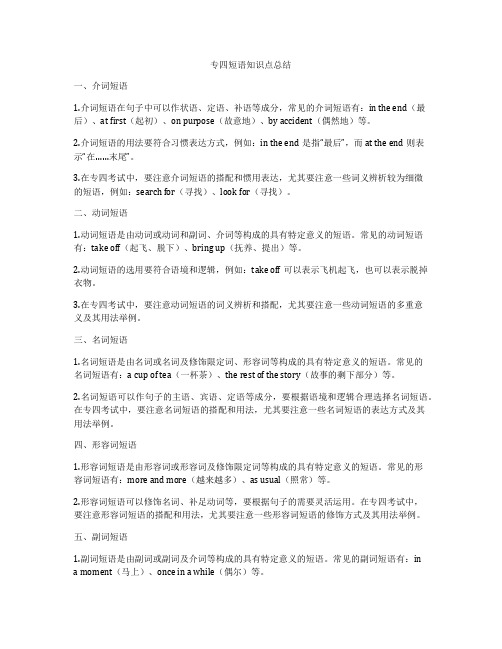
专四短语知识点总结一、介词短语1.介词短语在句子中可以作状语、定语、补语等成分,常见的介词短语有:in the end(最后)、at first(起初)、on purpose(故意地)、by accident(偶然地)等。
2.介词短语的用法要符合习惯表达方式,例如:in the end是指“最后”,而at the end则表示“在……末尾”。
3.在专四考试中,要注意介词短语的搭配和惯用表达,尤其要注意一些词义辨析较为细微的短语,例如:search for(寻找)、look for(寻找)。
二、动词短语1.动词短语是由动词或动词和副词、介词等构成的具有特定意义的短语。
常见的动词短语有:take off(起飞、脱下)、bring up(抚养、提出)等。
2.动词短语的选用要符合语境和逻辑,例如:take off可以表示飞机起飞,也可以表示脱掉衣物。
3.在专四考试中,要注意动词短语的词义辨析和搭配,尤其要注意一些动词短语的多重意义及其用法举例。
三、名词短语1.名词短语是由名词或名词及修饰限定词、形容词等构成的具有特定意义的短语。
常见的名词短语有:a cup of tea(一杯茶)、the rest of the story(故事的剩下部分)等。
2.名词短语可以作句子的主语、宾语、定语等成分,要根据语境和逻辑合理选择名词短语。
在专四考试中,要注意名词短语的搭配和用法,尤其要注意一些名词短语的表达方式及其用法举例。
四、形容词短语1.形容词短语是由形容词或形容词及修饰限定词等构成的具有特定意义的短语。
常见的形容词短语有:more and more(越来越多)、as usual(照常)等。
2.形容词短语可以修饰名词、补足动词等,要根据句子的需要灵活运用。
在专四考试中,要注意形容词短语的搭配和用法,尤其要注意一些形容词短语的修饰方式及其用法举例。
五、副词短语1.副词短语是由副词或副词及介词等构成的具有特定意义的短语。
大学英语4级语法笔记

大学英语4级语法笔记
1. 主谓一致
- 主语和谓语在人称和数上保持一致。
- 当主语是单数第三人称时,谓语动词要加s。
- 当主语是复数时,谓语动词不加s。
2. 动词时态
- 一般现在时:表示经常性或惯性的动作。
- 现在进行时:表示现在正在进行的动作。
- 一般过去时:表示过去某个时间发生的动作。
- 过去进行时:表示过去某一段时间内正在进行的动作。
- 现在完成时:表示过去某个时间发生的动作对现在造成的影
响或结果。
- 过去完成时:表示过去某个时间发生的动作对过去的另一个
时间或动作造成的影响或结果。
3. 形容词和副词的比较级和最高级
- 比较级:注意形容词和副词在比较级前面要加上more或less。
- 最高级:注意形容词和副词在最高级前面要加上the most或the least。
4. 名词所有格
- 表示属于关系时,在名词后面加's。
- 表示复数名词所有格时,在名词后面加'。
5. 祈使句和感叹句
- 祈使句表示命令、请求或建议,一般用动词原形。
- 感叹句表示惊讶、赞叹等情感,常以What、How等引导。
6. 介词的用法
- 介词用于表示位置、时间、方式等关系。
- 常用的介词有in、on、at、under、over等。
以上是大学英语4级语法的一些基础知识点,请在学习和写作时注意运用。
专四语法总结
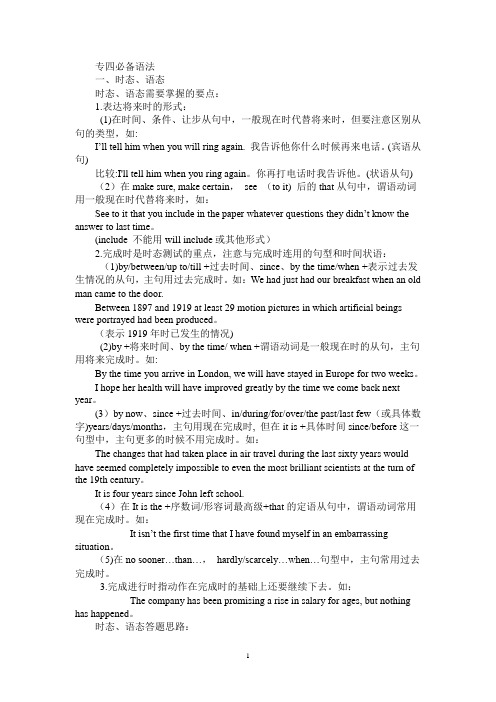
三、动名词
1.必须接动名词做宾语的动词
牢记下列要求接动名词做宾语的动词:
acknowledge, advocate, anticipate, appreciate,avoid,admit, confess, consider, delay, deny, enjoy,escape,excuse, fancy, favor, finish,forgive, imagine,involve, justify,mention, pardon,practice,postpone, recall,recollect,risk,resist,suggest,tolerate。如:
Between 1897 and 1919 at least 29 motion pictures in which artificial beings were portrayed had been produced。
(表示1919年时已发生的情况)
(2)by +将来时间、by the time/ when +谓语动词是一般现在时的从句,主句用将来完成时。如:
be said / reported / thought / believed / known / supposed + to do sth。
2。不定式做宾语
掌握要求接不定式做宾语的动词:
afford, arrange, attempt, claim, desire,determine,expect, fail, guarantee,endeavor, intend, pledge,pretend, resolve, request, swear, tend,venture。如:
专四语法汇总
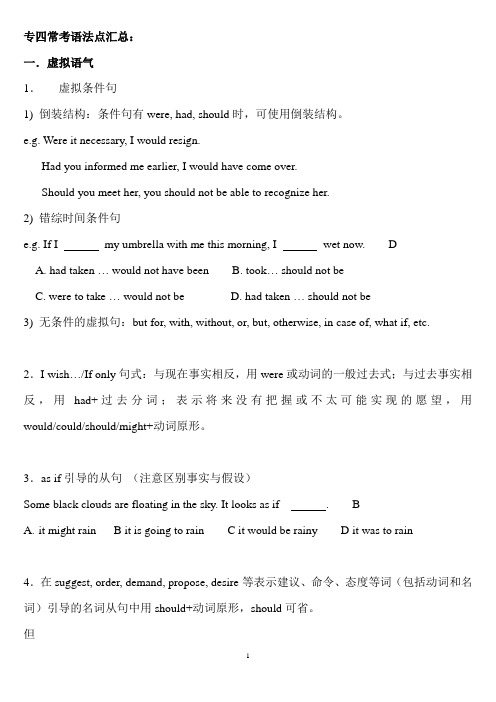
专四常考语法点汇总:一.虚拟语气1.虚拟条件句1) 倒装结构:条件句有were, had, should时,可使用倒装结构。
e.g. Were it necessary, I would resign.Had you informed me earlier, I would have come over.Should you meet her, you should not be able to recognize her.2) 错综时间条件句e.g. If I my umbrella with me this morning, I wet now. DA. had taken … would not have beenB. took… should not beC. were to take … would not beD. had taken … should not be3) 无条件的虚拟句:but for, with, without, or, but, otherwise, in case of, what if, etc.2.I wish…/If only句式:与现在事实相反,用were或动词的一般过去式;与过去事实相反,用had+过去分词;表示将来没有把握或不太可能实现的愿望,用would/could/should/might+动词原形。
3.as if引导的从句(注意区别事实与假设)Some black clouds are floating in the sky. It looks as if . BA.it might rain B it is going to rain C it would be rainy D it was to rain4.在suggest, order, demand, propose, desire等表示建议、命令、态度等词(包括动词和名词)引导的名词从句中用should+动词原形,should可省。
专四语法重点总结
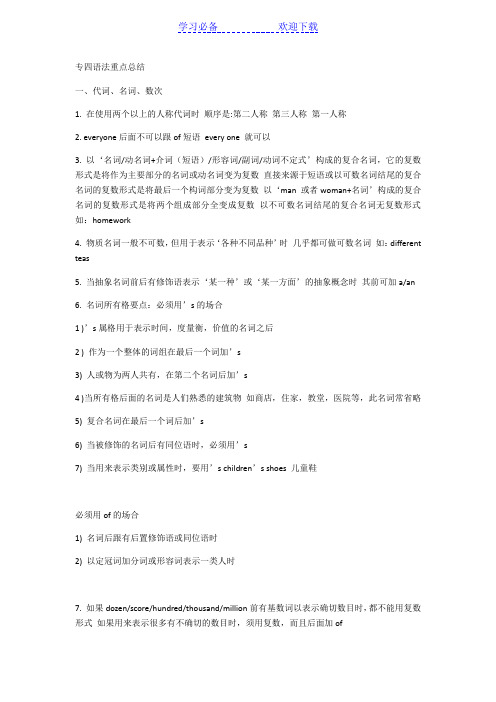
eg.
He is no richer than I= as poor as
He is not richer than I
4) more and more
eg. He is becoming fatter and fatter.
5). The more… the more…
Eg. He neither likes fiction nor (likes) poetry.
8) more than简直不
eg. My trip to Beijing is more than sightseeing.
六、并列结构
两个或两个以上意义相关、层次相同、句法功能也相同、并由并列连词或其他并列手段连接起来的语法结构序列叫做并列结构。
1.并列结构的各种形式
1)词与词的并列you and me
2) not only…but also连结成分和连接句子;只连对等结构
Eg. Not only I but also he will take part in the meeting.
Not only did he help me, but also he sent me home.
3) either…or连结成分和连接句子;连对等结构或不对等结构
单音节词尾e,加r, st fine finer finest
闭音节单音节词尾只有一个辅音字母,双写big bigger biggest
辅音字母加er,est
少数以y,er,ow, ble结尾
双音节词尾加er,est happy happier happiest(y前为辅音字母去y加clever cleverer cleverest
专四常考语法点汇总
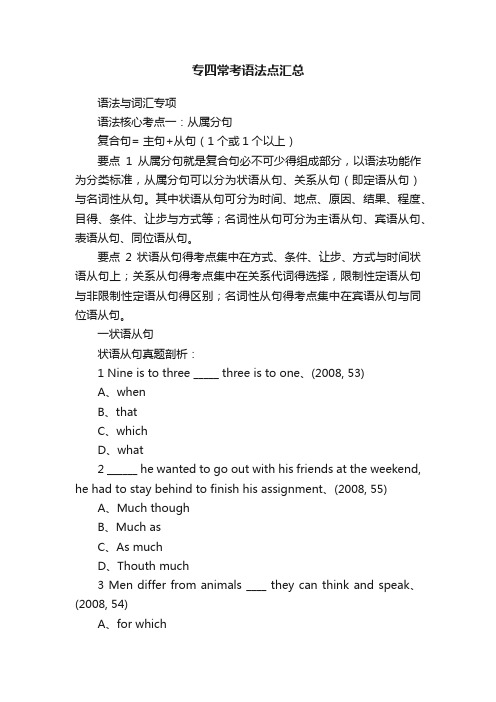
专四常考语法点汇总语法与词汇专项语法核心考点一:从属分句复合句= 主句+从句(1个或1个以上)要点1从属分句就是复合句必不可少得组成部分,以语法功能作为分类标准,从属分句可以分为状语从句、关系从句(即定语从句)与名词性从句。
其中状语从句可分为时间、地点、原因、结果、程度、目得、条件、让步与方式等;名词性从句可分为主语从句、宾语从句、表语从句、同位语从句。
要点2 状语从句得考点集中在方式、条件、让步、方式与时间状语从句上;关系从句得考点集中在关系代词得选择,限制性定语从句与非限制性定语从句得区别;名词性从句得考点集中在宾语从句与同位语从句。
一状语从句状语从句真题剖析:1 Nine is to three _____ three is to one、(2008, 53)A、whenB、thatC、whichD、what2 ______ he wanted to go out with his friends at the weekend, he had to stay behind to finish his assignment、(2008, 55)A、Much thoughB、Much asC、As muchD、Thouth much3 Men differ from animals ____ they can think and speak、(2008, 54)A、for whichB、for thatC、in thatD、in which4 They stood chatting together as easily and naturally as ____、(2008, 60)A、it could beB、could beC、it wasD、was5 The couple had no sooner got to the station ______ the coach left、(2009,60)A、whenB、asC、untilD、than6 ____ the boss says, it is unreasonable to ask me to work overtime without pay、(2010,55)A、WhateverB、WheneverC、WhicheverD、However7 Fool ____ Jerry is, he could not have done such a thing、A、whoB、asC、likeD、that8 He asked me to lend him some money, which I agreed to do, ___ that he paid me back the following week、(2005)A、on occasionB、on purposeC、on conditionD、only if9 Which of the following contains an adverbial clause of cause?A、I got a job as soon as I left university、B、As there was on answer, I wrote again、C、You must do the exercise as I show you、D、Wealthy as he is, Mark is not a happy man、状语从句重点总结:几种不常用得条件状语从句举例:In the event that she can not arrive on time, we will go first、Suppose it snowed, we would still go、Say what he said were true, what would you do about it?1、几种不常用得让步状语从句举例:In spite of the fact that he was deaf and dumb, he had a genius for music、While the grandparents love the children, they are strict with them、Much as she needed the job, she had to refuse、For all that there were a lot of difficulties, he finally entered the final competition and won、Granted you have made much progress, you should not be conceited、2、用了although或though,就一定不能再后面得从句中同时用but,但就是though 可以与yet 连用。
专四英语语法考点分析解析

语法考点之一:虚拟语气考点1. If从句中的虚拟语气1、与过去事实相反:从句sb had done,主句sb would(should, could, might)+ have done;2、省略if,从句的语序用到装,即将were, had或should移至主语的前面,但否定词not不前移。
3、与将来事实相反:从句sb did (should+do或were+to do),主句sb would (should, could, might)+do。
4、错综条件句:主句与从句的动作发生在不同的时间段。
比如:从句对过去虚拟,而主句对现在虚拟,即从句sb had done,主句sb would(should, could, might)+do;考点2:表示建议、要求、命令等动词如insist, order, command, suggest, advise, propose, ask, require, request, demand引导的从句和it引导的相应的分词、名词和形容词从句,谓语用(should)+动词原形。
考点3:It is +advisable, essential, important, imperative, incredible等从句,谓语用(should)+动词原形。
考点4:it is (high/about) time that的结构中,从句使用一般过去式。
例如:考点5:much as"尽管,虽然"引导让步状语从句,从句中用would have done表示假设。
考点6:if only, wish, as if/as though引导从句,与过去事实相反:had + done;与现在事实相反:动词过去式;与将来事实相反:could/would + do考点7:would rather/sooner从句中使用一般过去式或过去完成式分别表示对现在或过去的虚拟考点8:lest / for fear that+(should ) +原形动词。
英语专业四级语法汇总

语法回顾篇专四语法考点虚拟语气、情态动词、非谓语动词、复合句、倒装、小语法(省略,时态,反义疑问句,代词,强调句,主谓一致,冠词,形容词及副词)、as 的特殊用法。
专四英语语法考点串讲之一虚拟语气一般说来,有下列几种考点需要考生注意(十考点及两备考点)考点1. 与现在事实相反从句谓语动词用did(be用were),主句谓语动词would(should,could,might)+do;考点2. 与过去事实相反从句谓语动词用had done,主句谓语动词用would(should,could,might)+ have done;例如:43.I _________the party much more if there hadn‟t been quite such a crowd of people there.A. would enjoyB. will have enjoyedC. would have enjoyedD. will be enjoying49.All of us would have enjoyed the party much more if there _________ quite such a crowd of people there.A. weren‟tB. hasn‟t beenC. hadn‟t beenD. wouldn‟t考点3.与将来事实相反,从句谓语动词用:did(should+do或were + to do),主句谓语动词用:would(should,could,might)+do。
例如:43. If your car ___ any attention during the first 12 months, take it to an authorized dealer.(08年)• A. shall need C. would need• B. should need D. will need考点4. 时态的交叉现象,也就是主句与从句的动作发生在不同的时间段例如:If you had gone to see the doctor,you would be all right now.你要是早去看病,你现在就没事了。
专四备考资料词汇语法总结
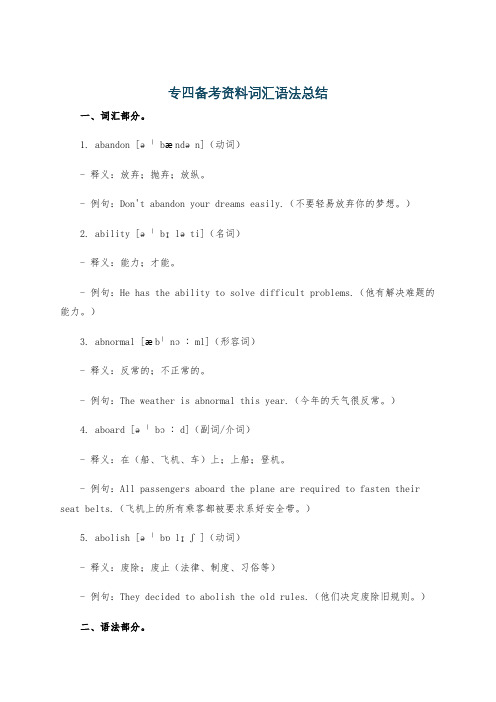
专四备考资料词汇语法总结一、词汇部分。
1. abandon [əˈbændən](动词)- 释义:放弃;抛弃;放纵。
- 例句:Don't abandon your dreams easily.(不要轻易放弃你的梦想。
)2. ability [əˈbɪləti](名词)- 释义:能力;才能。
- 例句:He has the ability to solve difficult problems.(他有解决难题的能力。
)3. abnormal [æbˈnɔːml](形容词)- 释义:反常的;不正常的。
- 例句:The weather is abnormal this year.(今年的天气很反常。
)4. aboard [əˈbɔːd](副词/介词)- 释义:在(船、飞机、车)上;上船;登机。
- 例句:All passengers aboard the plane are required to fasten their seat belts.(飞机上的所有乘客都被要求系好安全带。
)5. abolish [əˈbɒlɪʃ](动词)- 释义:废除;废止(法律、制度、习俗等)- 例句:They decided to abolish the old rules.(他们决定废除旧规则。
)二、语法部分。
1. 时态。
- 一般现在时。
- 结构:主语+动词原形(第三人称单数加 -s或 -es)- 用法:表示经常发生的动作、存在的状态或客观事实。
- 例句:He often goes to school by bike.(他经常骑自行车去上学。
)- 一般过去时。
- 结构:主语+动词的过去式。
- 用法:表示过去某个时间发生的动作或存在的状态。
- 例句:I saw him yesterday.(我昨天见到他了。
)- 现在进行时。
- 结构:主语+am/is/are+动词的 -ing形式。
- 用法:表示此时此刻正在进行的动作。
- 1、下载文档前请自行甄别文档内容的完整性,平台不提供额外的编辑、内容补充、找答案等附加服务。
- 2、"仅部分预览"的文档,不可在线预览部分如存在完整性等问题,可反馈申请退款(可完整预览的文档不适用该条件!)。
- 3、如文档侵犯您的权益,请联系客服反馈,我们会尽快为您处理(人工客服工作时间:9:00-18:30)。
专四语法总结Company number:【WTUT-WT88Y-W8BBGB-BWYTT-19998】专四必备语法(2)by +将来时间、by the time/ when +谓语动词是一般现在时的从句,主句用将来完成时。
如:By the time you arrive in London, we will have stayed in Europe for two weeks.I hope her health will have improved greatly by the time we come back next year.但在it is +具体时间since/before这一句型中,主句更多的时候不用完成时。
It is four years since John left school(一般过去式).(4)在It is the +序数词/形容词最高级+that的定语从句中,谓语动词常用现在完成时。
如:It isn’t the first time that I have found myself in an embarrassing situation.(5)在no sooner…than…, hardly/scarcely…when…句型中,主句常用过去完成时。
3.完成进行时指动作在完成时的基础上还要继续下去。
如:The company has been promising a rise in salary for ages, but nothing has happened.二、不定式1.不定式做主语(1)引导逻辑主语的介词:不定式的逻辑主语一般由介词for引导,但下列表示人的性格行为特征的形容词做表语时, 不定式的逻辑主语则由of引导:Experts say walking is one of the best ways for a person to stay healthy.、It is silly of you to be cheated by him..It’s clever of you to have invented such a device.It’s time for you to get up.3.不定式做定语做后置定语。
如:the first woman to set foot on the moon 第一个登上月球的女性This book is an attempt to help you use English and recognize how it is used.According to Darwin, random changes that enhance a species’ability to survive are naturally selected and passed on to succeeding generation.(5)不定代词something, nothing, little, much, a lot习惯上用不定式做定语。
如:Though we have made great progress, there is still much to be improved.I want something to eat.4.不定式做状语不定式做状语主要表示目的、程度、结果、方式。
so as to不能置于句首。
如:The solution works only for couples who are self-employed, don’t have small children and get along well enough to spend most of their time together.The vocabulary and grammatical differences between British and American English are so trivial and few as hardly to be noticed.only to表示意想不到的结果,Greatly agitated, I rushed to the apartment and tried the door, only to find it locked.三、动名词1.必须接动名词做宾语的动词牢记下列要求接动名词做宾语的动词:acknowledge, advocate, anticipate, appreciate, avoid, admit, confess, consider, delay, deny, enjoy, escape, excuse, fancy, favor, finish, forgive, imagine, involve, justify, mention, pardon, practice, postpone, recall,recollect,risk, resist, suggest, tolerate。
如:I appreciate having been given the opportunity to study abroad two years ago.2.动名词做介词短语考生尤其要识别下列短语中的to是介词,不是不定式符号:object to, resort to, react to, contribute to, look forward to, be accustomed to, be committed to, be exposed to, be subjected to, be devoted to, be dedicated to, be opposed to, be reconciled to, becon trary to, be (get) used to, come close to, get down to, give oneself up to, prefer…to, see to, set to, take to, in addition to, with regard to, with a view to, on the way to。
如:四、分词分词起形容词和副词的作用,在句中做定语或状语。
在概念上应清楚:●现在分词表示主动,表示动作在进行。
● 过去分词表示被动,表示动作结束了的状态或结果。
1.分词做定语,弄清现在分词与过去分词的区别分词短语做定语相当于省略了的定语从句,考生应掌握:(1)现在分词与被修饰词之间具有主动意义。
如:It’s easy to blame the decline of conversation on the pace of modern life and on the vague changes taking place in our ever-increasing world.There was a very interesting remark in a book by an Englishman that I read recently giving what he thought was a reason for this American characteristic.(相当于which gave...)How many of us attending a meeting that is irrelevant to us would be interested in the discussion (相当于How many of us who will attend...)(2)过去分词与被修饰词之间具有被动意义。
如:Good news was sometimes released prematurely, with the British recapture of the port announced half a day before the defenders actually surrendered.(相当于…recapture of the port which had been announced…)Just as the value of a telephone network increases with each new phone added to the system,Just with t he value of a telephone network increasing withThe author gave a detailed description based on his personal observation of nature.(相当于…description which was based on…)an escaped prisoner一个逃犯 a retired worker一位退休工人a faded curtain一个褪了色的窗帘 a newly arrived student一个新来的学生2.分词做状语,注意区分分词的一般式与完成式(1)表示时间,多置于句首,注意如果分词表示的动作的时间先于谓语动词,要用完成式。
如:Having completed one task, we started on another one. (complete先于start之前发生)3.分词的独立主格结构分词的逻辑主语一般为句子的主语,否则分词短语要有自己的逻辑主语,称为分词独立主格结构。
分词独立主格结构只是句子的一个部分。
如:All flights having been canceled because of the snowstorm, we decided to take the train. Darkness setting in, the young couple lingered on merrymaking.Weather permitting , we will go on a picnic.五、非谓语动词的其他考点1.接不定式或动名词做宾语都可以,但在意思上有区别的动词的用法mean to do想要(做某事) propose to do 打算(做某事)mean doing意味(做某事) propose doing建议(做某事)regret to do(对将要做的事)遗憾regret doing(对已做过的事)后悔三、句型:cannot help but do cannot but docannot choose but do can do nothing but dohave no choice/alternative but to do上述句型的意思接近,即“不得不做”、“不禁做”、“不由自主地做”、“不能不做”、“只能做”。
